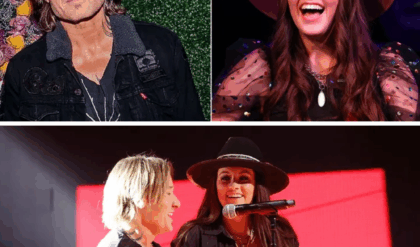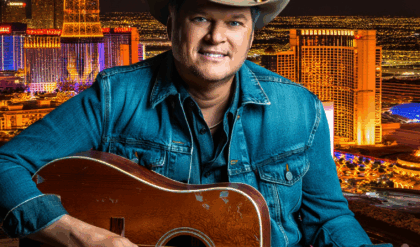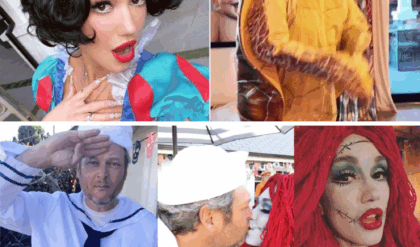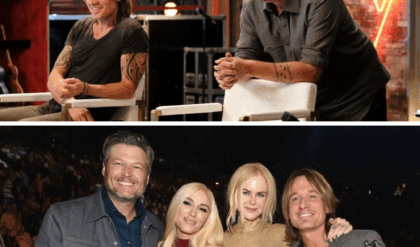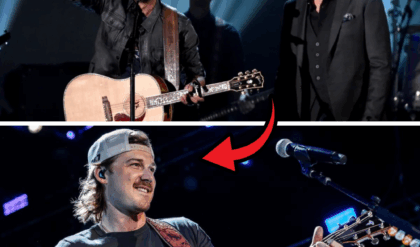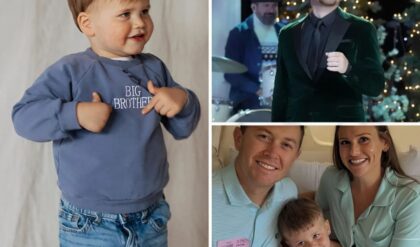In the glittering chaos of NBC’s The Voice Season 28 Blind Auditions, where polished pop stars and viral TikTok sensations vie for a shot at stardom, Dustin Dale Gaspard stepped onto the stage like a gust of humid bayou wind. On October 6, 2025, the 32-year-old singer-songwriter from Cow Island, Louisiana, cradled his acoustic guitar and launched into a soul-stirring rendition of Sam Cooke’s 1962 classic “Bring It On Home to Me.” But this wasn’t your standard soul revival. Gaspard infused the timeless plea for love and reconciliation with the raw, rhythmic pulse of Cajun French—his voice dipping into patois phrases that evoked misty marshes and moonlit fais-do-dos. Harmonica wails cut through like a distant train whistle, and his fingers danced across the strings with the unhurried grace of someone who’s spent more nights under the stars than spotlights.
The coaches—Reba McEntire, John Legend, Michael Bublé, and Niall Horan—spun their chairs in unison, a rare four-chair turn that sent the studio audience into a frenzy. “That’s what the people are asking for!” Legend exclaimed, his voice laced with genuine awe. Horan, the former One Direction heartthrob turned solo sensation, leaned forward with boyish urgency: “Please pick me.” Gaspard, with his easy smile and tousled hair framing a face weathered by road dust, ultimately chose Team Niall, sealing a partnership that promises to blend pop polish with unfiltered Americana grit. Viewers at home were captivated by the performance’s charm and soul, a bilingual bridge between Motown elegance and Louisiana’s untamed spirit. Social media exploded with clips, hashtags like #BayouSoul and #CajunVoice trending overnight.
Yet, as with so many reality TV breakthroughs, the two-minute spotlight on The Voice barely scratched the surface of Gaspard’s odyssey. What the cameras didn’t linger on—what the montage of quick cuts and swelling strings glossed over—was the underdog saga of a man who, in 2025 alone, racked up over 10,000 miles on the odometer of his battered pickup truck. From dive bars in Abbeville to house concerts in Houston, and even a detour north to the prairies of Alberta, Canada, Dustin Dale Gaspard has been chasing melodies across backroads, often with no roof over his head but the one on his truck. His story isn’t one of overnight virality or silver-spoon privilege; it’s a testament to the quiet ferocity of the working musician, the kind who measures success not in streams but in the nods from strangers in dimly lit rooms.
Cow Island, a speck of a community in Vermilion Parish, isn’t the sort of place that churns out household names. Tucked into the heart of Acadiana, it’s a landscape of endless sugarcane fields, gnarled live oaks draped in Spanish moss, and waterways that blur the line between river and sky. Here, music isn’t a hobby—it’s the heartbeat of survival, woven into Sunday zydeco jams and wedding receptions where accordions wail like lovesick ghosts. Dustin was born into this world in the early ’90s, the son of a family where talent ran as deep as the bayous. His father, a rough-handed oilfield worker with a soft spot for country crooners, first handed him a guitar when Dustin was just eight years old. “It was beat-up, missing a string or two,” Dustin later recalled in a pre-audition confessional, his drawl thick as roux. “But Dad sat me down on the porch after supper, and we picked out ‘Wonderful Tonight’ by Eric Clapton. That was it. The hook was set.”
Music became Dustin’s anchor amid the uncertainties of rural life. Cow Island’s economy ebbs with the price of crawfish and crude oil, and young Dustin watched neighbors lose homes to floods or layoffs. School was a means to an end, but the real education came from boot-stomping at local dances, where he’d sneak peeks at fiddlers and washboard players laying down the foundational grooves of Cajun and zydeco. By his early teens, he was self-taught on the harmonica, mimicking the bends and breaths of legends like Clifton Chenier. Bilingual from the cradle—English at school, Cajun French at home—Dustin’s ear for language mirrored his ear for melody. He’d scribble lyrics in notebooks during church, verses about lost loves drifting down the Mermentau River or the ache of leaving home for the first time.
It wasn’t until age 17, though, that Dustin crossed the threshold from dreamer to doer. A late bloomer by music industry standards, he picked up performing in earnest after a family move to nearby Lafayette, a city pulsing with the “saturated” scene of open mics and festival stages. His first gig was a nerve-wracking slot at a coffeehouse poetry night, where he fumbled through an original called “Bayou Lullaby.” The crowd—mostly college kids and aging hippies—didn’t boo, and that was victory enough. From there, it snowballed. He busked on the streets of the French Quarter during Mardi Gras weekends, hat out for tips that bought strings and gas. He formed loose bands with high school buddies, blending folk introspection with the swampy swing of his roots. Dustin dubbed his sound “Bilingual Acoustic Roots,” a gumbo of influences: the storytelling of Woody Guthrie, the soulfire of Sam Cooke, the joie de vivre of Doug Kershaw.
But dreams don’t pay the rent, and Dustin’s early twenties were a grind of day jobs—bartending at a Vermilion Parish roadhouse, hauling seafood crates at dawn. Music was squeezed into off-hours, gigs that paid in beer and handshakes. He released his first recordings on a shoestring budget, self-produced tracks uploaded to Bandcamp and SoundCloud. Songs like “Swamp Witch” and “Cajun Moon Rising” caught the ear of regional radio stations, earning spins on KRVS in Lafayette. Critics—sparse as they were—hailed him as a “bayou bard,” a poet of the wetlands whose lyrics painted vivid portraits of resilience amid hardship. One track, a haunting banjo-driven lament about Hurricane Rita’s scars, even landed him an invite to the Louisiana Folklife Festival.
By 2023, Dustin had leveled up, trading local loops for longer hauls. A feature in a Dallas music blog caught the eye of promoters in Texas and Oklahoma, leading to his first out-of-state tours. That’s when the real road life kicked in. He sold his bass boat to buy a used Ford F-150, kitted out with a mattress in the bed and a cooler for po’boys. “It was freedom, you know?” he says, eyes crinkling with the memory. “No lease holding you down, just you, the guitar, and the horizon.” But freedom has teeth. Winters in the truck meant huddling under blankets against the Gulf chill, summers brought sweat-soaked drives with the AC busted. Gigs ranged from packed honky-tonks to empty stools at VFW halls, where he’d play for tips that barely covered the 300-mile trek back home.
2025 marked the pinnacle—and the breaking point—of this nomadic chapter. Dustin hit the road hard in January, mapping a serpentine route through the South and beyond. He kicked off in New Orleans for Jazz Fest prep shows, then zigzagged west to Austin’s South by Southwest sidelines, where he shared bills with indie folk upstarts. Northward to Nashville for songwriter rounds at the Bluebird Cafe, then east to Charleston for a seafood festival slot that devolved into an impromptu porch jam. By midsummer, he’d veered international, answering a call from a Canadian roots festival in Edmonton. “I’d never seen snow like that,” he laughs. “Played a set in a barn with Mounties in the crowd, then drove back south feeling like I’d conquered the world.” The miles piled up: 10,000 by Labor Day, documented in blurry Instagram stories of sunsets over oil rigs and scribbled setlists on napkins.
Living out of the truck wasn’t glamorous. There were nights parked at Walmart lots, engine idling to drown out doubts. A breakdown in rural Mississippi left him stranded for three days, thumb out until a passing trucker towed him to a mechanic who took vinyl records as partial payment. Relationships frayed under the strain—girlfriends tired of canceled dates, family worried over spotty check-ins. Yet, each low fueled the fire. “The road strips you bare,” Dustin reflects. “No facade, just your songs and whatever truth they hold. That’s when you learn if it’s worth it.” It was. Fans multiplied, drawn to his authenticity. A viral clip from a Houston house concert—him trading verses in French with a tipsy audience—garnered 50,000 views, whispers of Grammy nods circulating in Acadiana circles.
Word of Dustin’s hustle reached The Voice producers through a Lafayette talent scout who’d caught his set at the 2024 Festival Acadiens et Creoles. An audition tape, filmed in the truck’s cab with a phone propped on the dash, showcased his Cajun twist on “A Change Is Gonna Come.” It was enough to earn him a golden ticket to L.A. Preparations were frantic: borrowing a clean shirt from his sister, practicing until his fingers blistered. Walking onto that stage, under the glare of lights brighter than any festival flood, Dustin felt the weight of every mile. “This is for the ghosts of the gigs that never happened,” he thought, strumming the opening chords.
The performance unfolded like a revelation. His voice, a warm baritone laced with gravel from years of smoky bars, wrapped around Cooke’s lyrics with intimate vulnerability. Then came the switch: midway through the bridge, he slipped into Cajun French, pleading “Ramène-moi chez moi” with a harmonica solo that evoked the wail of a far-off steamboat. The coaches’ reactions were electric—McEntire whooping like she’d heard a lost Doug Kershaw track, Bublé calling it “soul with a side of spice.” In the post-turn scrum, Dustin fielded pitches with humble wit: Legend promised gospel depth, Reba roots revival. But it was Horan’s raw enthusiasm—”I’ve got the pop machine, but you bring the heart”—that sealed it. Team Niall it was, a duo poised to remix bayou ballads for the charts.
In the days since airing, Dustin’s phone hasn’t stopped buzzing. Streams of his catalog have spiked 500%, old tracks like “Arrêtte Ça” climbing indie playlists. Offers pour in: a development deal from a Nashville label, festival headliner slots for 2026. He’s traded the truck mattress for a crash pad in Lafayette, courtesy of a generous fan, but vows to keep the wheels turning. “This ain’t the end,” he says. “It’s just the map unfolding wider.”
For The Voice fans, Dustin Dale Gaspard’s arc is pure catnip: the everyman triumph, the cultural infusion that reminds us talent blooms in the unlikeliest soils. But beyond the edits and applause, his story whispers a deeper truth. In an era of algorithm-driven fame, where TikTok teens go platinum overnight, Dustin embodies the slow burn of art born from necessity. He’s the kid from Cow Island who turned swamp whispers into national roars, proving that sometimes, the longest roads lead to the brightest stages. As he gears up for the Battle Rounds, harmonica at the ready, one can’t help but wonder: What’s next for the bayou bard? Whatever it is, it’ll carry the scent of marsh grass and the echo of 10,000 miles—unfiltered, unbreakable, and utterly alive.
